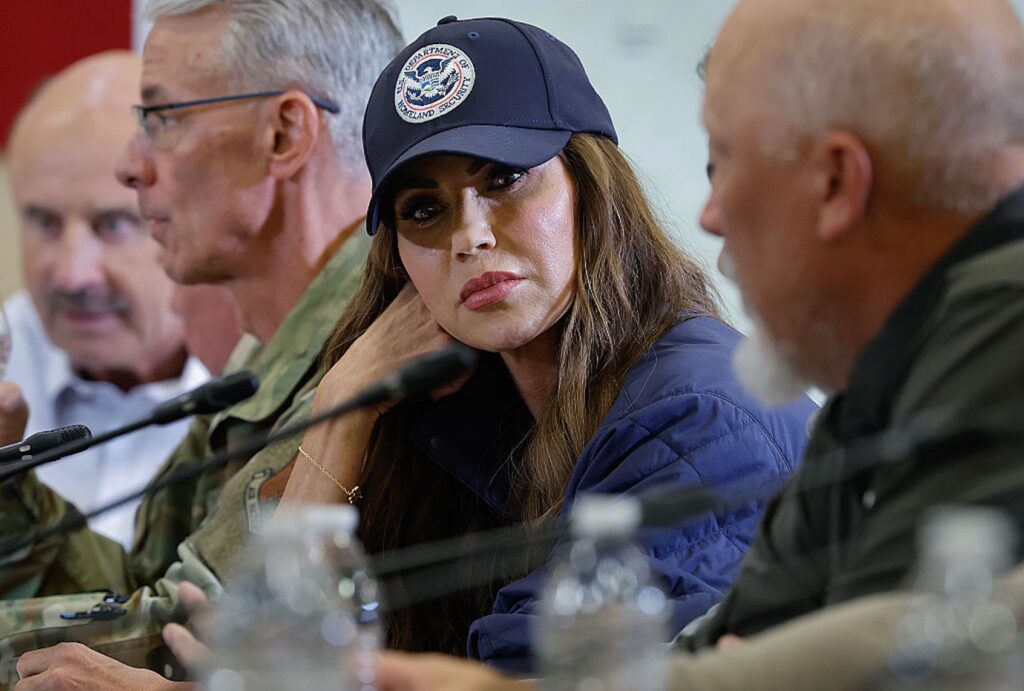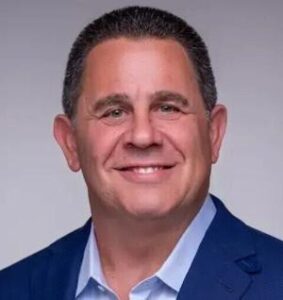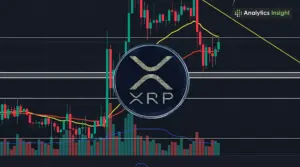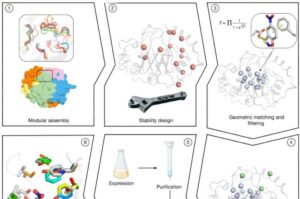
KERRVILLE, TEXAS - JULY 11: Secretary of Homeland Security Kristi Noem participates in a round table event with President Donald Trump at the Hill Country Youth Event Center to discuss last week's flash flooding on July 11, 2025 in Kerrville, Texas. Trump traveled to Texas one week after flash flooding along the Guadalupe River swept through cities, mobile home parks and summer camps, killing 120 people. Ninety-six of those killed were in Kerr County, where the toll includes at least 36 children. (Photo by Chip Somodevilla/Getty Images)
The political landscape surrounding the Federal Emergency Management Agency (FEMA) is increasingly contentious, particularly as Texas grapples with the aftermath of devastating floods. South Dakota Governor Kristi Noem, who now serves as an assistant secretary at the Department of Homeland Security, has reiterated her intention to significantly alter or dismantle FEMA, despite its critical role in disaster relief.
Recent reports suggest that former President Donald Trump has not abandoned his long-standing criticism of FEMA, despite mainstream media characterizing his recent comments as a retreat from plans to abolish the agency. Instead, the narrative indicates a shift toward rebranding and reorganizing FEMA, which Trump and Noem have described as part of a “bloated bureaucracy.” This characterization undermines the agency’s essential functions at a time when many Americans depend on federal support during natural disasters.
Noem’s intentions have been clear since at least February 2024, when she declared her goal to “get rid of FEMA as it exists today.” By March, reports surfaced indicating that she planned to subject the agency to the “chopping block.” Throughout this period, she has emphasized that FEMA must fundamentally change or cease to exist in its current form.
The significance of FEMA’s operations cannot be overstated, especially as climate change increases the frequency and severity of natural disasters. Public sentiment generally supports FEMA, with approximately 80% of Americans asserting that the federal government should play a major role in disaster recovery efforts. This widespread backing complicates Noem’s position, as she attempts to distance the federal government from responsibilities that many citizens believe it should uphold.
Noem’s commitment to reducing FEMA’s influence aligns with a broader right-wing agenda that has historically sought to undermine federal support systems. This agenda often includes unsubstantiated conspiracy theories about FEMA, which have persisted since the agency’s establishment under President Jimmy Carter in 1979. These theories typically suggest that FEMA’s true purpose is to detain American citizens, particularly targeting white Christians, under the guise of disaster relief.
The persistence of such theories was particularly notable during the aftermath of Hurricane Katrina in 2005, when the federal government’s response was criticized for racial insensitivity. In subsequent years, the election of President Barack Obama further fueled paranoia, leading to a significant rise in conspiracy theories positing that the federal government would target conservative citizens.
The continuation of these conspiracy narratives in the current political climate raises questions about the motivations behind Noem’s and Trump’s disdain for FEMA. The former president has made claims that FEMA funds are being misused to support undocumented immigrants, further entrenching the agency in controversy.
Moreover, Noem has taken concrete actions that have hindered FEMA’s ability to respond effectively to recent disasters. Reports indicate that she imposed a spending cap of $100,000 on FEMA without her direct approval, creating delays in the agency’s response to the flooding in Texas. This decision has drawn criticism for potentially exacerbating the suffering of those affected by the floods. Additionally, FEMA’s acting director, David Richardson, has faced scrutiny for his lack of public engagement and leadership during this crisis.
The broader implications of Noem’s and Trump’s positions reflect a particular philosophy regarding the role of government: one that favors minimal intervention in the lives of citizens, especially those who are less affluent. Under their vision, support systems such as FEMA are seen as unnecessary burdens on state governments rather than essential lifelines for vulnerable populations.
As the situation in Texas continues to evolve, the ongoing debate surrounding FEMA highlights the tension between federal and state responsibilities in disaster management. The question remains whether the agency will be able to maintain its critical functions in the face of political opposition and changing policy objectives.







